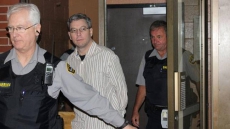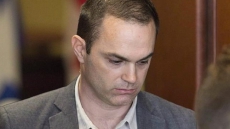OTTAWA — Donald Trump may be running to lead America's right-wing political party, but his views aren't welcome by Canada's right-wing party, the interim leader of the Conservatives says.
Trump's position should not even be considered right-wing, but something far beyond that, said Rona Ambrose in a wide-ranging year-end interview with The Canadian Press.
"I think he's off the spectrum, frankly," Ambrose said. "That's not a voice that we welcome in our party."
Earlier this month, Trump, who is hoping to lead the Republican party in the 2016 U.S. presidential election, called for a temporary ban on Muslim immigration to the United States. He has also advocated for Syrian refugees to be registered in a national database and has suggested Muslims should carry ID cards.
Backlash against Muslims in the U.S. has been growing in recent months and Trump's comments have been blamed for fanning those flames. While the comments have drawn widespread condemnation, polls suggest around half of Republicans support those positions.
Ambrose said she's thankful that kind of discourse isn't happening among Canada's political leadership, but acknowledged Trump's remarks come with consequences.
"I think what happens is, it fuels the fire for people that have very bad intentions and then they act," she said.
"There's no excuse for that, Donald Trump is not an excuse . . . I don't think his rhetoric helps the case."

Canada has not been immune from anti-Muslim backlash either. After the attacks in Paris linked to Islamic extremists, a mosque in Peterborough, Ont., was set on fire and a Muslim woman was attacked in Toronto.
Ambrose said that when she spoke out publicly against some of those incidents, she was also criticized.
If that criticism — and any other type of anti-Muslim sentiment in Canada — comes from people purporting to be part of the Conservatives, they aren't, she said.
"I won't take ownership of any of those people," she said.
The Conservatives have been accused in the past of not doing enough to combat Islamophobia — and potentially exacerbating it.
Two policy promises during the campaign — a tip line to report "barbaric cultural practices" and a decision to prioritize Christians in refugee resettlement programs devoted to the Syrian crisis, where most of the victims are Muslim — were seen by some Muslims as deliberate provocations.
Ambrose has said before she believed the tip line wasn't a helpful policy, but said her work with abused women has shown there is such a thing as "barbaric practices" and more needs to be done.
"The way to get to those issues is to work with these young women closely and offer them shelter when they need help because they are fleeing from oppression and sometimes very serious abuse and violence; and if we're talking about honour crimes or other issues, these young women need help," she said.

On refugees, she said the focus needs to be on helping the most vulnerable, and Christians are among them. To dismiss the idea there's no religious group that is more vulnerable than others is to dismiss some of the problem in Syria, she said.
But the way the Conservatives are now approaching the refugee file — advocating for a slow-down in the resettlement timeline and more assistance for private sponsors — is an example of the new tone she wants to set for debate in the House, Ambrose said.
It's not just about raising issues that are important to Conservatives, but to all Canadians, she said, and in a civil way.
"Our job is to ask good, tough questions but there is no need to be petty in the House of Commons. It starts at the top," she said.
In the coming months, Ambrose said, she will be working to expand outreach to existing party supporters and potential new ones ahead of the coming leadership race.
The foundation of the party is strong, she said. In October, the Conservatives garnered 31.9 per cent of popular support, down about eight percentage points from the previous election.
With the Liberals appearing to hue further left than the NDP, Ambrose said the party thinks it has room to pick up some of their more fiscally conservative supporters.
She said there is also room for the Conservatives to grow their own policy playbook.
Their philosophy of favouring market-based approaches could be applied, she said, to issues like the environment.

"That can happen in a leadership race, if a leadership candidate has a vision. This is where these kind of new visions come forward," she said.
"And that's an exciting time for a party."





